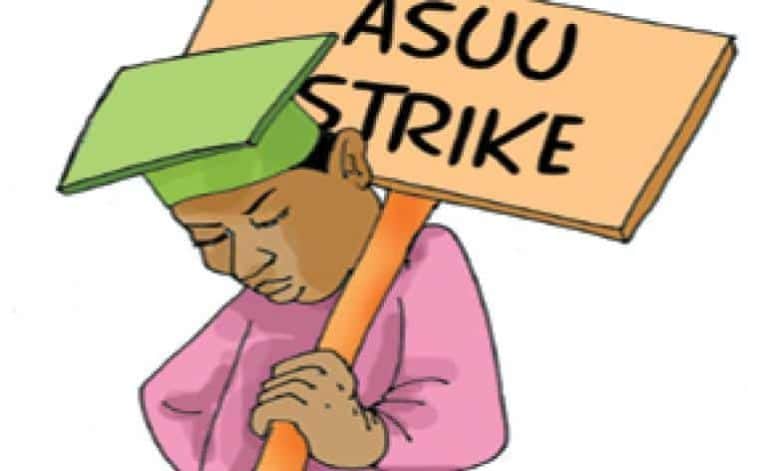In a move that’s set to plunge Nigeria’s public universities into chaos once more, the Academic Staff Union of Universities (ASUU) has officially declared a total and comprehensive two-week warning strike, effective from midnight on Monday, October 13, 2025. This ASUU strike declaration, announced amid mounting frustration with the federal government’s foot-dragging on longstanding demands, threatens to halt lectures, exams, and campus life for millions of students, echoing a painful cycle of disruptions that have plagued higher education for decades.
The hammer fell during a fiery press conference at ASUU’s headquarters in the University of Abuja on Sunday, where National President Prof. Chris Piwuna laid bare the union’s exasperation. “There is nothing sufficient on the ground to stop the implementation of ASUU-NEC’s resolution to embark on a two-week warning strike at the expiry of the 14-day notice given on September 28, 2025,” Piwuna declared, directing all branches nationwide to withdraw services immediately after the deadline lapses. He framed the action as a last-ditch “window” for President Bola Tinubu’s administration to salvage talks, but warned that failure to act could trigger an indefinite shutdown. Piwuna accused the government of “habitual lies” and delays, pointing to stalled renegotiations of the 2009 ASUU-Federal Government Agreement—a pact meant to revitalize universities through better funding, welfare, and infrastructure but left gathering dust for over 15 years.
This ASUU strike isn’t born of whimsy; it’s the culmination of a saga rooted in broken promises and economic neglect. The 2009 Agreement, signed amid post-strike concessions, promised N1.3 trillion over five years for university revitalization, but disbursements have trickled to a mere fraction, leaving labs dilapidated, libraries outdated, and lecturers scraping by on salaries eroded by 35% inflation since 2023. Add to that unpaid Earned Academic Allowances (EAA)—over N500 billion owed—and withheld salaries from past disputes, and the powder keg was primed. ASUU’s September 28 ultimatum, issued after a National Executive Council meeting in Abuja, demanded swift action on these fronts, plus implementation of the 2022 Professorial Salary Scale and withheld third-party deductions. Despite Education Minister Dr. Tunji Alausa’s mid-week plea—claiming “final phase” talks and touting N50 billion released for EAA plus N150 billion budgeted for 2025 needs assessment—Piwuna dismissed it as insufficient, noting a 20% deduction from ASUU’s share to placate other unions like SSANU and NASU.
The fallout is already rippling. University of Jos’s ASUU branch, fresh off a local strike over June 2025 salary delays, briefed student leaders on October 10, explaining the push as a bid for “sustainable university systems” amid government indifference. At Niger Delta University, Piwuna reiterated during a training session that “no going back” until demands are met, urging mobilization to curb the “Japa” brain drain of 5,000 lecturers since 2023. Experts like Prof. Anthony Anenih, a former ASUU chair, called it a “necessary evil,” warning in a Vanguard interview that unchecked neglect risks collapsing Nigeria’s tertiary sector, already ranked 132nd globally in research output by Times Higher Education.
Public fury is boiling over on social media, where #ASUUStrike and #EndASUUPain exploded with over 150,000 posts in hours. Students vented heartbreak—”Just when I was signing my logbook,” lamented one final-year engineering hopeful—while parents decried the “theft of futures.” Opposition voices, including Labour Party’s Peter Obi, blasted Tinubu’s team for “dribbling” educators, tweeting: “ASUU’s patience is Nigeria’s loss—fund education or face the exodus.” APC defenders, like Bayo Onanuga, countered that the administration’s N50 billion payout shows goodwill, urging “realism over rhetoric.” Civil society groups like the Nigerian Association of Resident Doctors echoed solidarity, fearing knock-on effects on medical training, while economists warn of a 2% GDP dip from disrupted human capital development.
For everyday Nigerians, this ASUU strike declaration cuts deep into the economy’s veins. Higher education’s paralysis—potentially idling 2 million students across 50 federal universities—exacerbates youth unemployment at 53%, per NBS data, fueling petty crime and “Japa” waves that drain $10 billion in remittances annually. Politically, it amplifies 2027 election fault lines: Tinubu’s “Renewed Hope” agenda, promising education as a pillar, now faces scrutiny amid N28 trillion debt servicing that squeezes budgets. Technologically, stalled research means Nigeria lags in AI and renewables, with universities like Ahmadu Bello churning out outdated curricula while peers in Kenya surge ahead. Lifestyle blows hit families hard—parents juggling multiple jobs for fees that yield empty semesters, students turning to hustles or online courses amid blackouts. Sports? Forget nurturing talents like Super Eagles prospects; campus facilities crumble further, robbing grounds for grassroots soccer.
User intent here is raw desperation: Parents and students scour for timelines, alternatives like private unis or abroad scholarships, and pressure tactics—petitions to Elecam or #OccupyASUU campaigns. Managing the storm calls for federal agility: Verified progress on the 2009 Agreement could pause the clock, but history—from 2022’s eight-month hell—breeds doubt. As Piwuna put it, “We’ve conceded in the national interest; now reciprocity is due.”
This two-week warning teeters on a knife’s edge—will Tinubu’s negotiators deliver, or does it prelude another lost academic year? With midnight Monday looming, Nigeria’s classrooms hang in the balance, a stark reminder that education’s neglect isn’t just policy failure; it’s generational sabotage. The clock ticks, and the nation waits.
By Sam Michael
Follow us and subscribe for push notifications to stay ahead of breaking Nigerian education and political stories—your voice demands accountability.
SEO Tags: ASUU strike 2025, ASUU declares warning strike, Nigeria university shutdown October 13, ASUU demands 2009 agreement, Chris Piwuna ASUU president, federal government ASUU negotiations, Nigerian students ASUU strike impact, education crisis Nigeria, Tinubu ASUU dispute, unpaid academic allowances strike
